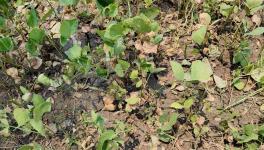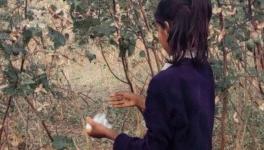COVID-19 in Rural India-XXVII: A Bleak Future for the Poorest in MP’s Badora Village
This is the 20th report in a series that provides glimpses into the impact of COVID-19-related policies on life in rural India. The series, commissioned by the Society for Social and Economic Research, comprises reports by various scholars who have been conducting village studies in different parts of India. The reports have been prepared on the basis of telephonic interviews with key informants in their study villages. This report tries to assess the impact of the restrictions imposed due to the COVID-19 pandemic in context of Badora village in southern Madhya Pradesh.
Located on the banks of the Sapna River in Betul district of Madhya Pradesh, Badora is a large village with a population of around 7,500 people. It is just off National Highway 47 and three kms from Betul city, which also serves as the headquarters of the district. So far, the district has one confirmed case of COVID-19.
About 70% of households in the village are Other Backward Classes (OBCs),among which the prominent castes are Kunbi and Pawar. Several households in the village also belong to those categorised as Scheduled Tribes (STs). Around 25% of households in Betul do not own land and are primarily employed as casual labourers. Most farming households have small operational holdings not greater than five acres andthere are only ten households that have operational holdings greater than 25 acres.
The village is primarily irrigated by the Sapna dam and almost half the area under cultivationis used to grow sugarcane. Wheat and black gram are the important Rabi crops and soya bean is grown during the Kharif season. Badora also is the hub of agricultural equipment and fertilizer shops in the district.
Impact of the Lockdown on the Sugarcane crop
Most farming households in Badora grow sugarcane on between50% to 75% of their agricultural land. They sell the produce to a sugar mill which is about ten kms away from the village. Sugarcane farmers have been carrying out earthing-up operations in their sugarcane fields since mid-March. Earthing up involves taking soil both sides of the furrow and putting it on the base of the shoot. The process is usually accompanied by the application of fertilisers. Many small farmers in the village source their fertilisers from the co-operative society and have tried contacting the officials who run it over the last fortnight. However, the society has not been functional since the lockdown was announced. Moreover, all the agricultural input shops have been shut since March 22. Due to this, there has been a delay in the application of fertilisers to the sugarcane crop, which will adversely impact the height of the crop, resulting in decreased yield.
Impact on the Wheat Crop
Wheat is either harvested manually or by using small machines in the village. At the time of harvesting, labourers, primarily members of the ST community (known locally as adivasis), travel from Bhainsdehi, Athner and Chicholi tehsils of Betul district to work in the wheat fields. Due to restrictions on movement, many of them have been unable to reach the village, resulting in an acute shortage of labour during harvesting.
Along with this shortfall, the required number of reaper machines had not been brought to the village from nearby districts in time. Hence, the price of engaging these machines increased from Rs 800 per hour to Rs 1,100 per hour. Due to the insufficient labour and machines, almost all farming households are using family labour to complete the harvesting of wheat this season. Another major problem encountered during harvesting was the shortage in availability of binder rope, which is used to tie the bundles of wheat; the price of an eleven-kg bag of ropes went up from Rs 1,100 to Rs 1,800. A similar problem was faced in procuring storage bags. The increase in prices of these essential items has put additional pressure on the farmers.
Around 80% of the wheat crop in the village had been harvested. As the majority of farming households sow wheat in a small area, their production is limited and they prefer to sell it immediately after harvesting. Badora agricultural mandi was opened on April 15 after having been shut for 25 days. Keeping social distancing in mind, only six farmers were allowed to sell their produce on the first day after the mandi resumed operations. Factoring this, farmers are anticipating further delays in selling their produce.
Impact on Other Crops
Most farmers in the region practice intercropping, and grow potato, onion and garlic along with sugarcane. The bulk of the produce is sold in the Badora mandi. On account of its closure, farmers had to make temporary arrangements to stock the harvested produce at home.
There are three poly houses in the village that are primarily used for vegetable cultivation. The owners usually transport their produce to major centres like Amravati and Nagpur. They incurred some losses due to the sudden and complete shutdown of transport facilities in the third week of March. They sold a part of their crop, mainly tomatoes and cucumbers, in the village. As the owners of these poly houses are established businessmen, they managed to get a permit fairly quickly and were able to transport their crop in time.
Impact on the Dairy Business
Small farmers in Badora supplement their income by selling milk on a daily basis. Though the trend of keeping livestock has been on a decline in this village, a large number of households still keep a few animals. The village has a local dairy that collects excess milk. The collected milk is then sold to the Sanchi Cooperative run by the Government of Madhya Pradesh. Due to a fall in the demand for milk following the imposition of the lockdown, milk collection was disrupted for around five days. There were no other alternatives to sell the milk, as all the restaurants in Betul have remained closed during this period. Some households sell milk directly to sweet shops in the city, which continue to be shut during the lockdown. So, these households have been unable to sell milk in the last 25 days and their earnings have taken a hit as a result.Some of the livestock needed urgent medical attention but no veterinarian has visited the village. And with shops closed, cattle feed remains unavailable.
Impact on Manual Workers
Close to a hundred people from the village are employed in the Kosmi industrial area in Betul. Some villagers also work in the nearby flour and oil mills butdue to the closure of factories, these workers are now at home. They did receive their wages for the month of March but are uncertain about their current employment status. Most individuals from landless households in the village are employed in the construction sector and in various shops in Betul city as daily wage workers.
During the lockdown, these workers have not been able to get work in agriculture as they lack skills required to perform specific work. These households are surviving on ration received from the panchayat under the Public Distribution System. There are 555 beneficiaries in the village who have been provided rations for three months at the beginning of March. This is a common practice in the wheat-growing belt of Madhya Pradesh; beneficiaries are provided rations for three months in advance before the start of the wheat procurement season.
Out of the 109 active workers from the village on the MGNREGA list, 90% are women. The officer-in-charge at the village level has been instructed to identify some small work in the village that would provide employment under the MGNREGA scheme to these women after the situation normalises. There was no work available under the scheme in the last few months and registered workers have not received any money from the government to get them through the lockdown. Three households registered complaints with the CM’s helpline on account of the complete unavailability of food last week and they were provided rations by the village panchayat.
In order to help the vulnerable households, a group of relatively well-off farmers distributed ration kits comprising five kgs of rice, two kgs of wheat flour, two kgs of dal and a packet of salt to some SC and ST households.
There are five anganwadi centres in the village but their regular work has been suspended; anganwadi staff have been deployed to conduct a survey of village households to identify people who had returned to the village just prior to the lockdown. Ninty such people were identified and they have been asked to quarantine themselves at home.
About 120 migrant labourers from Chhindwara district who had been returning to their homes from Tamil Nadu, were intercepted by the police in Betul and sent to Badora on March 29. These workers spent several days in the village and were allowed to proceed to their homes only after undergoing a medical examination. This has created a sense of unease among the residents of the village.
Impact on the Prices of Essential Commodities
The prices of milk and vegetables have remained unchanged due to these commodities being produced in the village and its surroundings. Grocery shops were given permission to open for only three hours every day in the district. However, there are several small grocery shops in the village which function from owners’ homes. These remain open for the customers. This has ensured the availability of grocery items. But, the prices of some essential commodities have risen in the last 20 days; vegetable oil has gone up from Rs 99 per litre to Rs 130 per litre; sugar from Rs30 per kg to Rs 45 per kg and the prices of pulses and rice have also gone up by ten per cent.
Input dealers are worried due to the lack of supply of essential fertilisers and pesticides. A shop owner from the village had placed an order for 100 tonnes of the commonly used fertilizer DAP before the lockdown was announced, and is yet to receive its delivery. Owing to the current unavailability of fertilizers for the sugarcane crop, farmers are anticipating a rise in the prices of these fertilisers.
There are three ATMs in the village and a branch of the Bank of Maharashtra. Even though the branch is operational, not many people have visited the branch since the lockdown began.
Disruptions caused by restrictions owing to the lockdown have exacerbated the distress of a population already feeling the strain. The village, comprised largely of small farmers and casual labourers is still seeing thecrisis unfold without knowing the long-term implications of it. However, given the magnitude of the situation, immediate state support is needed to help households in the village survive the adverse economic effects of this pandemic.
Sunit Arora is a Research Scholar at the Centre for the Study of Regional Development, Jawaharlal Nehru University, New Delhi
Get the latest reports & analysis with people's perspective on Protests, movements & deep analytical videos, discussions of the current affairs in your Telegram app. Subscribe to NewsClick's Telegram channel & get Real-Time updates on stories, as they get published on our website.
























